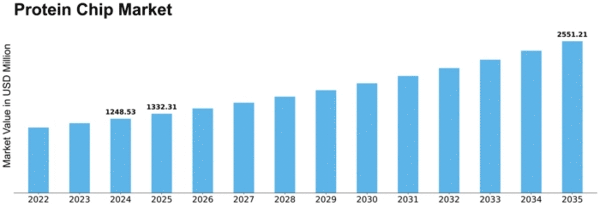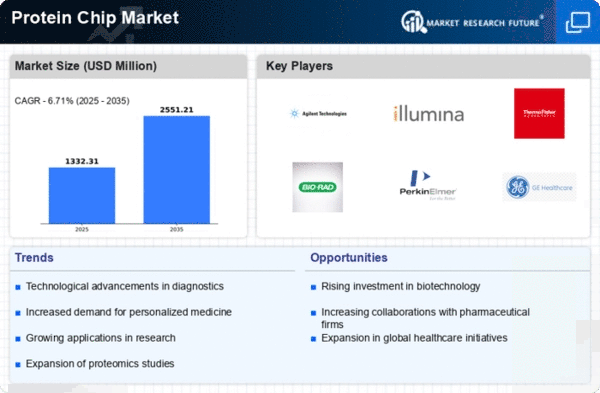Protein Chip Size
Protein Chip Market Growth Projections and Opportunities
Protein chip sales are rising due to the rapid rise of proteomics research. For high-throughput protein analysis, protein chips assist researchers explore protein synthesis, connections, and functions. This illuminates various biological processes and situations. Microarray technology advancements fuel the market. Recently developed surface chemicals, sensing techniques, and combination choices have made protein chips, a form of microarray, more effective for in-depth protein study. The pharmaceutical industry is adopting protein chips increasingly for medication research and development, expanding the market. Protein chips can test several medicines simultaneously. This streamlines medication development and helps uncover novel therapy targets. Personalized medication is driving protein chip sales. Protein chips allow for personalized therapies and diagnostics based on each patient's DNA and molecular background. Protein chips are crucial for biomarker discovery, which advances diagnosis and therapy. Protein chips let researchers identify and confirm disease biomarkers. They may utilize this for early diagnosis and targeted therapy. Protein chips are increasingly employed in clinical testing. Because these chips allow simultaneous protein analysis in patient samples, illness understanding and detection tools have improved. Genomic and transcriptomics technologies function well with protein chips. Combining data from diverse omics systems deepens biological discoveries and helps us comprehend cells and illnesses. Due to global research and development spending, protein chips are becoming increasingly popular. Funding innovative educational and corporate ventures boosts the protein chip sector. Protein chip sales are heavily influenced by universities and research institutions. These schools do cutting-edge research, making protein chips essential for understanding protein interactions, illnesses, and signaling networks. It boosts the market. Protein chips provide high-throughput protein analysis by allowing scientists to investigate thousands of proteins simultaneously. Large-scale research benefit from this speed because it helps us understand complex biological processes. Biotechnology, pharmaceutical, and research institutes are collaborating to expand and modify the protein chip business. Protein chips may be utilized for more when individuals collaborate to develop new technologies, exchange data, and research across areas. Standards and data interpretation issues limit industry expansion. However, these issues allow firms to create consistent methods, simple research tools, and instructional materials to maximize protein chip adoption.




















Leave a Comment